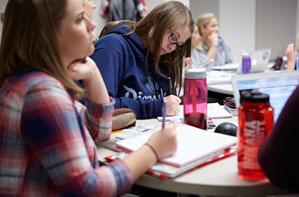Latest NSSE finds college selectivity bears little relationship to students' experiences with faculty
Findings released today from the National Survey of Student Engagement at the IU Center for Postsecondary Research show how the average student experience can vary considerably from one institution to the next, even among institutions that are similar with regard to enrollment and admissions selectivity.
The results reveal, for example, few relationships between selectivity and student-faculty interaction. Institutions with lower selectivity profiles can and often do offer experiences with faculty that are at least comparable to those at more selective institutions.
The report, "Bringing the Institution Into Focus: Annual Results 2014," details results from more than 355,000 first-year and senior students attending 622 U.S. colleges and universities that participated in NSSE in spring 2014. NSSE’s annual survey provides colleges and universities with rich data about the undergraduate experience to help them improve student learning and success.
“Our findings challenge the conventional wisdom that certain characteristics of colleges and universities assure a high-quality educational experience,” said NSSE Director Alexander C. McCormick.
Other noteworthy findings from the 2014 NSSE and its companion surveys, the Beginning College Survey of Student Engagement and the Faculty Survey of Student Engagement, include:
- Although African American and Latino students overall reported lower quality of interactions with others (students, faculty, advisors and other staff) than their white peers, the results revealed an appreciable share of institutions where the difference between groups was absent or reversed.
- The number of times first-year students met with an academic advisor was positively related to perceptions of a supportive campus environment, and this holds across racial-ethnic groups. Unfortunately, about one in three first-year students rarely met with an advisor (23 percent had one meeting, and 9 percent never saw one). The proportion who rarely sought advice was higher among commuting, nontraditional-aged and part-time students.
- Both first-year students and seniors reported a considerable emphasis by instructors on information literacy skills such as assessing the quality of information sources and properly citing them. But while 74 percent of first-year students said their instructors emphasized questioning the quality of information sources, only 37 percent of first-year students and 36 percent of seniors frequently decided not to use an information source due to quality concerns.
- Learning-directed uses of social media were positively related to all of NSSE’s measures of student engagement. The strongest relationships were with reflective and integrative learning, collaborative learning, and student-faculty interaction.
- About two in five first-year students and one-third of seniors said social media substantially distracted them from their coursework.
- First-year students who earned higher grades than they had expected scored higher on seven of 10 engagement indicators compared to students who performed below their expectations. They also spent more time studying and less time working for pay.
- On average, faculty devoted more time to teaching activities than to research, service and advising. Full-time faculty averaged nine hours per week preparing for their classes, close to 10 hours teaching and an additional 17 hours on other instructional activities such as grading and meeting with students outside class. Faculty who devoted more time to teaching improvement had higher expectations for their students’ learning, spent less class time lecturing, interacted more with students and more often used effective teaching practices.
This year’s findings suggest that institutional culture, policy and practices can make a difference in the quality of the student experience. Muriel Howard, president of the American Association of State Colleges and Universities, said, “It is very important for presidents who want to make a difference to be particularly sensitive to institutional culture, how it can be changed and how they can influence that change.”
NSSE’s Annual Results 2014 is sponsored by The Carnegie Foundation for the Advancement of Teaching.
 The latest NSSE results show a variety of student experiences even among similar institutions.
The latest NSSE results show a variety of student experiences even among similar institutions.